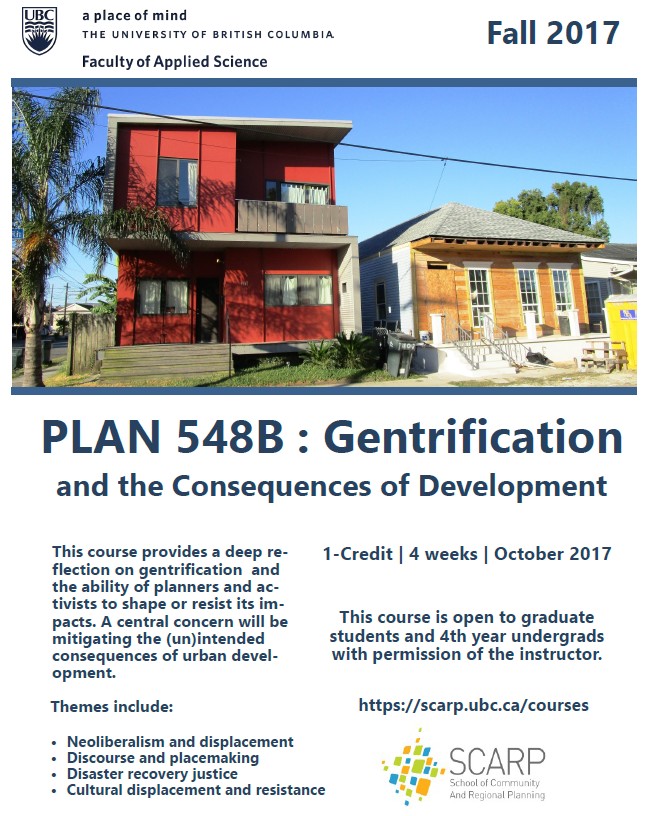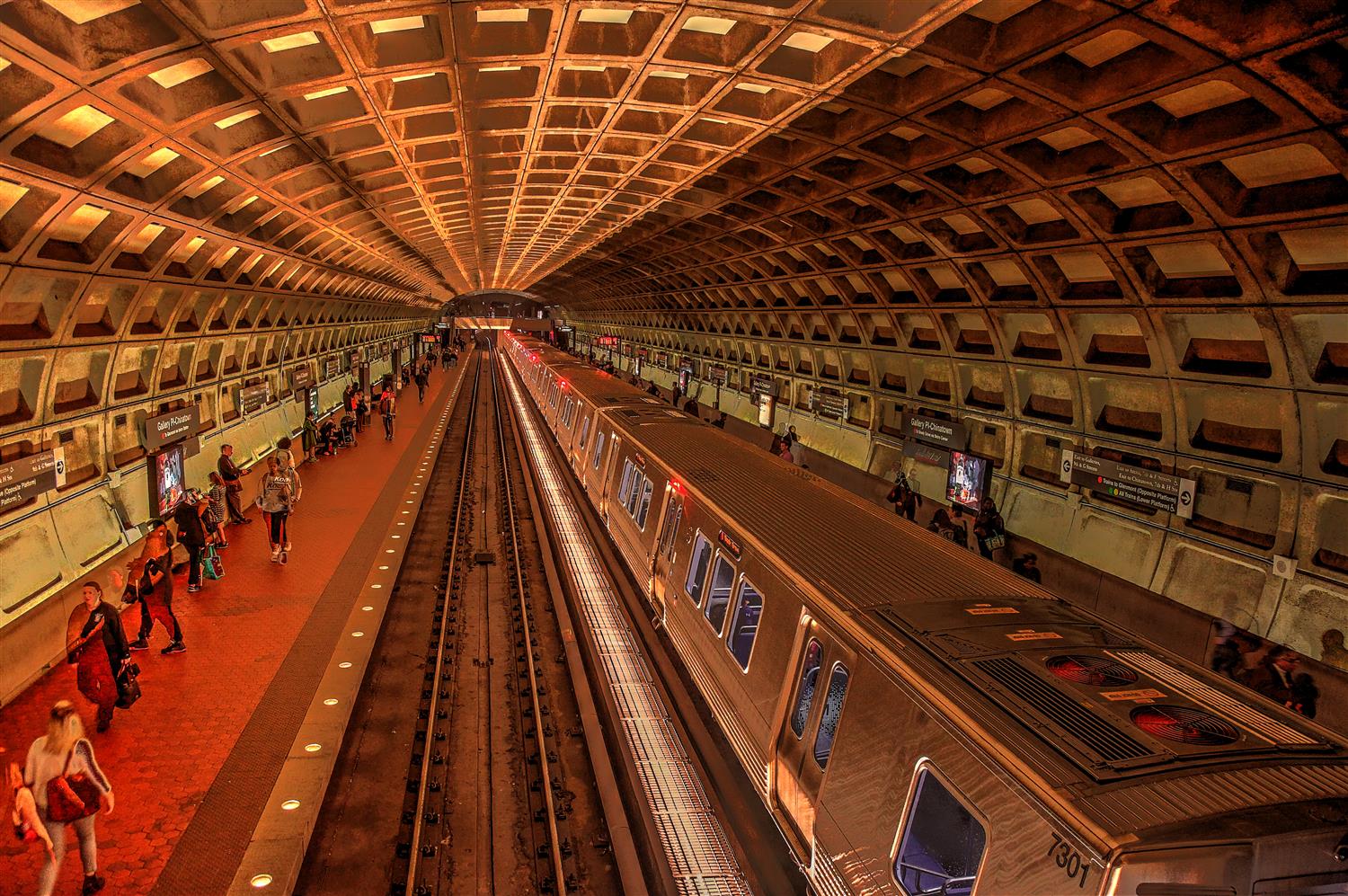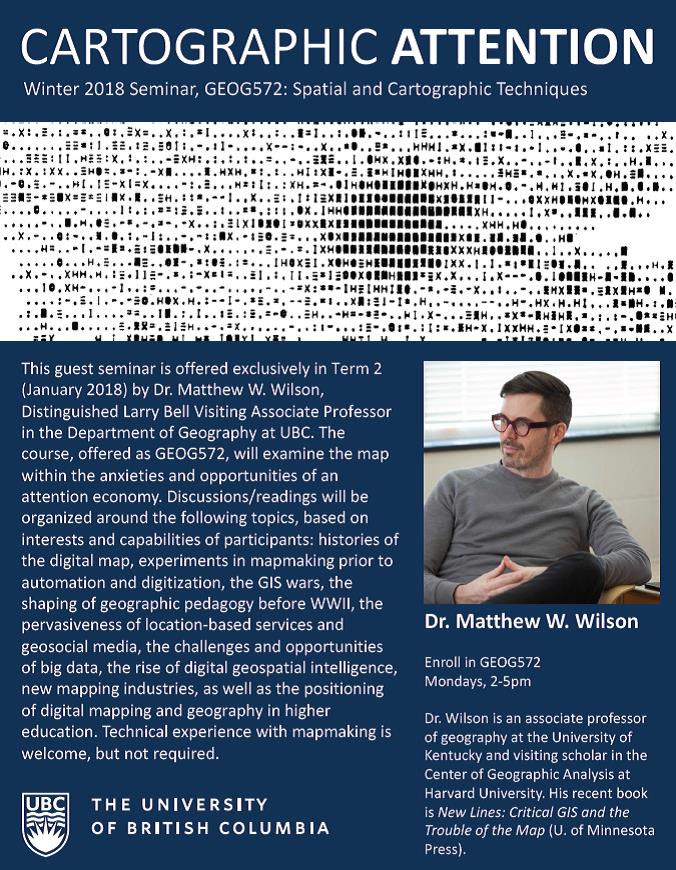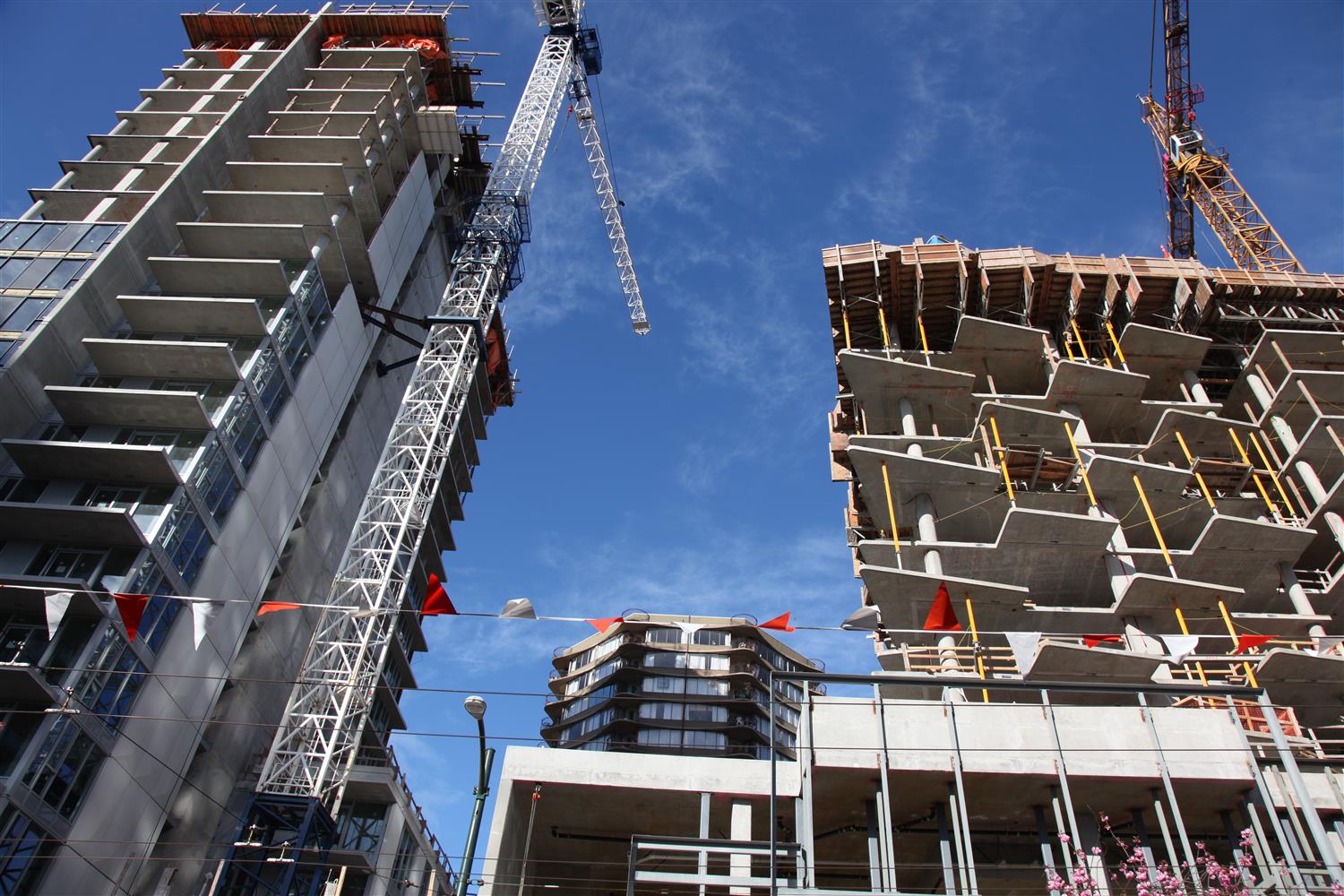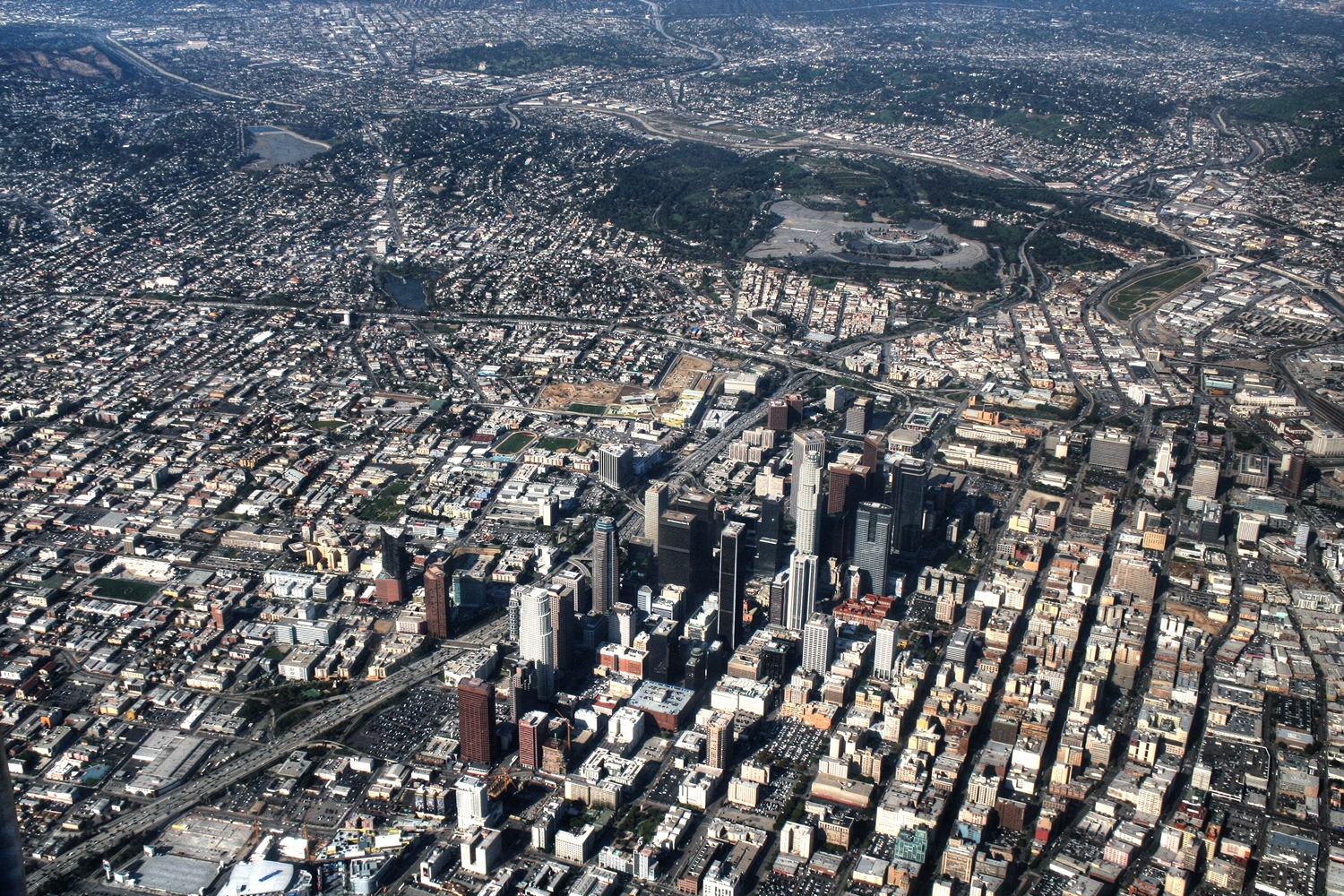

Courses
Core Courses
CopyLeft 2019 UBC Urban Studies
Except where otherwise noted, this site is
licensed under a Creative Commons Attribution 2.5 License
"One by one, many of the working class quarters of London have been invaded by the middle classes--upper and lower. Shabby, modest mews and cottages--two rooms up and two down--have been taken over, when their leases expired, and have become elegant, expensive residences. Larger Victorian houses, downgraded in an earlier or recent period--which were used as lodging houses or were otherwise in multiple occupation--have been upgraded once again...Once this process of 'gentrification' starts in a district it goes on rapidly until all or most of the original working class occupiers are displaced and the social character of the district is changed." Ruth Glass (1964). "Introduction: Aspects of Change" in London: Aspects of Change, Centre for Urban Studies (Ed.), London: MacKibbon and Kee, pp. xviii-xix.
Students in the Urban Studies program usually take Urban Studies 200 in their first or second year, followed by three lower-level courses chosen from various disciplines. Choices here range from Anthropology to Environmental Design, First Nations and Indigenous Studies, Geography, Political Science, and Sociology. In the third and fourth year, students choose five upper-level courses; options here include offerings in Asian Studies, Classical Studies, Economics, Geography, Gender, Race, and Social Justice, History, Near Eastern Studies, Planning, Sociology, and Urban Forestry. Finally, in the fourth year, students join Urban Studies 400, the capstone Urban Studies Seminar.
Below is an evolving list of courses across various parts of UBC that you can consider for the Urban Studies Minor. There's not always a precise match with the formal program requirements listed in the calendar, because different departments across the University are frequently adding new courses -- and in other cases, older courses may not always be offered each year. So if your Degree Navigator doesn't let you choose one of these to fulfill the Minor Requirements, get in touch with the Urban Studies Program Chair, Elvin Wyly (email ewyly@geog.ubc.ca or cell 778 899 7906). And let us know if you find other courses with urban focus that you'd like to include as part of your program!
Please note that some of the courses listed below have prerequisites or other restrictions. In some cases you may need to consult the course calendar, the relevant department, or the course instructor before registering.
LOWER-LEVEL COURSES
URST 200 Cities
An interdisciplinary introduction to the city in the context of contemporary globalization. Analysis of urban patterns and processes from the theoretical perspectives of various disciplines and methodologies.
ANTH 202 Contemporary Social Problems
Cultural background to contemporary events; problems of nationalism and regional conflicts, economic and social development, gender, religion and social change. Course may stress a different region of the world in different years.
ENDS 220 Architecture in Context: Vancouver
The unfolding architecture and urbanism of Metro Vancouver. Using Vancouver as a laboratory to examine the historical transformation of the built environment, and how this has affected particular activities, land uses, and social groups within the region. Credit will be granted for only one of ENDS 220 or DES 220.
ENDS 221 Sustainability by Design
Introduction to interactions between human and natural urban systems using local and international examples of successful sustainable community designs. Credit will be granted for only one of ENDS 221 or DES 230.
ENDS 231 Thinking by Design
Introduction to design thinking through the analysis of architecture, landscape architecture, urban design, and hands-on design projects. Credit will be granted for only one of ENDS 231 or DES 200.
FNIS 100 Indigenous Foundations
The historical, cultural, political, economic and legal issues that inform the experiences of Indigenous peoples in Canada, examined from both Indigenous and non-Indigenous perspectives. Credit will be granted for only one of FNIS 100, FNSP 100, or FNSP 200.
GEOG 121 Geography, Environment, and Globalization
Human geography of the modern world with particular attention to human-environment relationships, urbanization, and regional growth; trade and communications; environment and war; environmental governance and sustainability.
GEOG 122 Geography, Modernity and Globalization
The human geography of the modern world since 1945: global interdependence in economic geography, geopolitics, and cultural geography; consequences of modernization, including demography, urbanization and environmental effects; regional case studies; reactions to modernization.
GEOG 290 Introduction to the Geography of Canada
Selected topics in human geography focusing on the regional distribution of natural resources, population, urban systems, and economic activities.
PLAN 211 City-Making: A Global Perspective
Contemporary city development trends, policies, and practices across the globe as explored against the backdrop of culture and technology. Includes hands-on learning.
PLAN 221 City Visuals
An exploratory journey through the vast world of visualizing the city and ways of representing the built environment, including how to both interpret and use visualizations to read the city.
POLI 101 The Government of Canada
An examination of the institutions and processes of Canadian government.
POLI 260 Introduction to Global Politics
Applies conceptual tools to topics such as war, conflict management, the global economy, poverty, and civil society.
SOCI 102 Inequality and Social Change
Inequality, institutions, social structure and social change. Credit will be granted for only one of SOCI 102 or SOCI 100.
UPPER-LEVEL COURSES
URST 400 Seminar in Urban Studies
A seminar for senior students who wish to explore some common topics of importance to urban studies from the viewpoints of several disciplines.
ASIA 325 Hong Kong Cinema
A survey of the cinema of Hong Kong from the post-war period to the present. The influence of Hong Kong on global cinema, and the forces (artists, studios, audiences, etc.) that have given rise to filmmaking styles and genres perceived as "distinctively Hong Kong."
CLST 331 Greek Art and Architecture
The visual culture of the ancient Greek world in the second and first millennia BCE, especially from c. 1000 to 30 BCE.
CLST 332 Roman Art and Architecture
The visual culture of the ancient Roman world from the 8th century BCE to the 4th century CE.
ECON 310 Principles of Microeconomics
The scope of this course is approximately the same as that of ECON101. The course is intended for upper-level students only. Credit will be granted for only one of ECON 310 or ECON 101.
ECON 311 Principles of Macroeconomics
The scope of this course is approximately the same as that of ECON 102. The course is intended for upper-level students only. Credit will be granted for only one of ECON 311 or ECON 102.
ECON 374 Land Economics
Economic analysis applied to problems of land use. Rent theory. Land valuation. Land conservation. Techniques for assessing economic efficiency of land use. Effects of institutions and public policies on land use.
GEOB 401 Urban Meteorology
The impact of urbanization upon atmospheric processes and climates. The energy and water balances of cities. Meteorological effects (urban heat island, precipitation modification, etc.) and their significance. Models of the urban atmosphere.
GEOG 311 Urban Environments
The impact of urban development on the natural environment and vice versa. Study of the ecology and metabolism of cities and green urban design, using global and local case studies.
GEOG 321 Historical Geography of Urbanization: Cities, Space, and Power
From the origins of urbanism to the modern era.
GEOG 328 Constructing Canada
The construction of Canadian political space after Confederation, aboriginal-newcomer relations, regional development and conflict, industrialization, urbanization, and war.
GEOG 350 Urban Worlds
City systems and theories of urban location; internal spatial structure of the city; commercial and industrial location; social areas; neighbourhood and land use change; urban trends and public policy.
GEOG 352 Urbanization in the Global South
Urbanization in the developing countries of Latin America, Africa, and Asia; the role of cities in the development process and the features and problems of rapid urbanization.
GEOG 353 Geographies of Migration and Settlement
International regimes regulating migration, changes in global demographics, immigration policies of nation states, international migration patterns, settlement policies and outcomes.
GEOG 357 Introduction to Social Geography
The development of social and behavioural geography, focusing on how places, landscapes, and enviromments both reflect and shape social life.
GEOG 364 Globalization, Cities, and Regions
Forms of economic development; changing location of economic activities and functions; implications for government and politics; local strategies for growth and equity.
GEOG 450 Urban Research
Individual or group primary research. Instructor and content vary and it may be offered over 2 terms. Details available from Geography Undergraduate Advisor from April 1 preceding the course. Not necessarily offered each year.
GEOG 457 Social and Behavioural Geography
Theories of social change in the global city; labour markets; poverty and inequality; social polarization; housing markets; gentrification and housing affordability; immigration and segregation; diversity and multiculturalism; transnationalism; the entrepreneurial state; the convivial city.
GRSJ 306 Globalization and Social Justice: Gender, Race, and Sexuality in International Politics
Critical examination of the gender dimension of globalization and the theories, discourse, and practices in international politics using gender analysis.
GRSJ 307 Gender, Race, Sexuality, and Popular Culture
Critical examination of mainstream and alternative media images of gender, race, and sexuality in the context of networked social media, film, music, and television.
HIST 302 History of the Indigenous Peoples of North America
Indigenous peoples from pre-contact to the present in Canada and the U.S. Topics include colonial frontiers, disease, fur trade, government policies, environment, gender, religion, oral narratives, activism, urbanization, and identity.
HIST 415A History of Vancouver
Selected themes in the history of Vancouver, exploring how the study of the past illuminates or explains major debates in the city today.
NEST 304 Ancient Egypt: The Archaeology of the Land of the Pharaohs
The material remains of the ancient Egyptians from monumental tombs and temples to the artifacts of daily life; the development of Egyptian civilization from the rise of the first rulers to its incorporation into the Roman Empire.
NEST 402 The Archaeology of the City in the Ancient Near East
The material manifestations of urbanism in the ancient Near East, from the 4th millennium BC up to the 1st millennium BC. Credit will be granted for only one of NEST 402 or 506.
PLAN 321 Indigeneity and the City
Place-based exploration of the multiple, complex and contested ways urban Indigeneity is constituted in Canada today, with opportunities for field trips and hands-on learning.
PLAN 331 The Just City in a Divided World
Considers the city as a terrain for the manifestation and mediation of social justice. Explores how the allocation of land, goods, and services in cities (re)produces social stratification, and how institutions and civil society negotiate just and unjust outcomes.
PLAN 341 Smart Cities: Concepts, Methods and Design
Rapid transformation of cities by information technology and socio-economic innovation; growth in citizen-generated data and the internet of things; emerging theory, methods, and frameworks for understanding "Smart Cities."
PLAN 425 Urban Planning Issues and Concepts
Evolution, practice and future of urban planning and development, with emphasis on institutional arrangements, housing, transportation, urban design and development control. For third- and fourth-year undergraduate students interested in urban planning.
SOCI 301 Sociology of Development and Underdevelopment
Processes of social change in the Third World and other developing countries. Major themes stress the relationship between urbanization and industrialization; modernization and ethnic conflict; imperialism, neo-colonialism, and foreign aid; and intra-national modernization problems such as regional underdevelopment in industrial societies.
SOCI 364 Built Environments
Physical, social, and economic aspects of built environments, including housing and community planning.
SOCI 425 Urban Sociology
Demographic, behavioural, and organizational aspects of urban structures and of urbanization in different societies and periods.
UFOR 402 Urban Forestry Administration, Policy and Law
The administrative, legal, policy, and business environments for urban forestry governance, management, and planning.
UFOR 403 Ecological Restoration
Ecological principles relevant to restoration of ecosystems are applied to the restoration of several types of ecosystems.
*
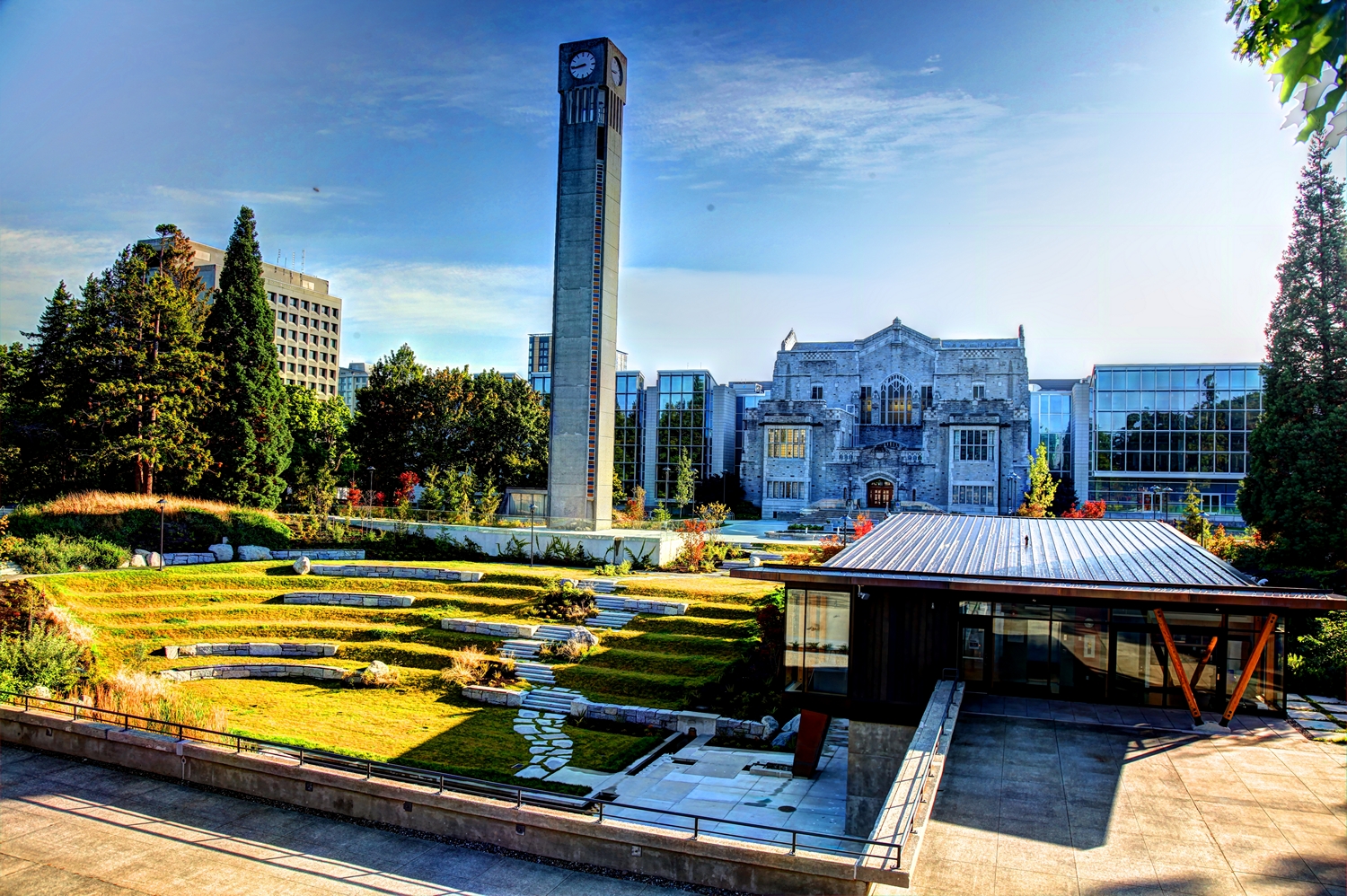
Courses
New Course for January 2018!
Indigeneity and the City
Urban Indigeneity in Canada Today
PLAN 321 | January 3rd thru April 6th **Rescheduled for term 2**
Credit hours (3)
Tuesdays & Thursdays, 12:30pm to 2:00pm
This course introduces students to the multiple, complex, and contested ways urban Indigeneity is constituted in Canada today. Through various strategies such as lectures, guest speakers, presentations, videos and site visits, students will critically engage with settler colonial constructions of Indigeneity and urban space, with attention to how such narratives continue to be expressed today. These issues will be examined from interdisciplinary and comparative perspectives drawing on material from the fields of Indigenous Studies, History, Cultural Geography, Planning and Community Health Studies. Through focusing on the role of local governments in addressing Indigenous/non-Indigenous relationships, students will gain a deeper understanding of how community and municipal development is closely connected to Indigenous self-determination and resurgence. The major assignment will immerse students in a city engagement project in which they will have the opportunity to activate the principles of place-based learning while engaging in contemporary urban development issues.
This course is taught by Lyana Patrick, member of the Stellat'en First Nation and a PhD Candidate in the School of Community and Regional Planning whose research focuses on urban Indigenous peoples and pedagogical practices that advance Indigenous Knowledge for the benefit of Indigenous communities.
New Course for January 2018!
New Course for Winter 2019!
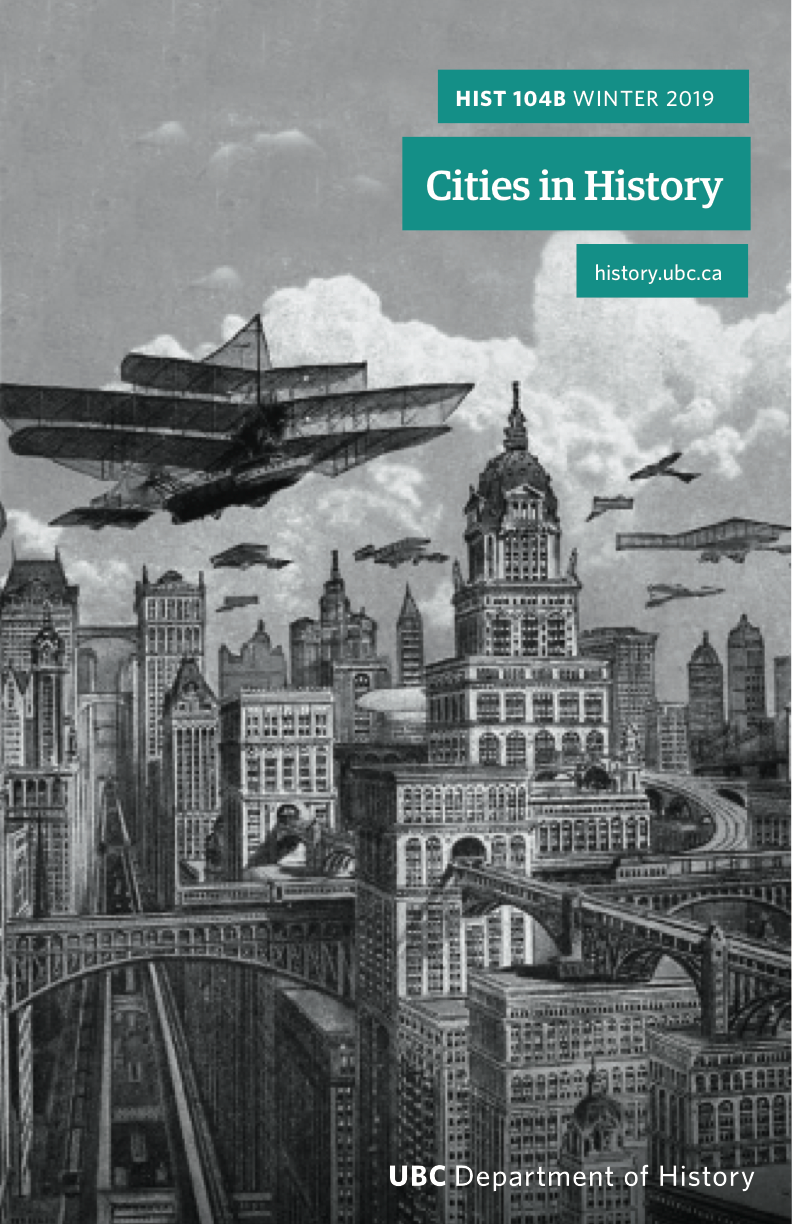
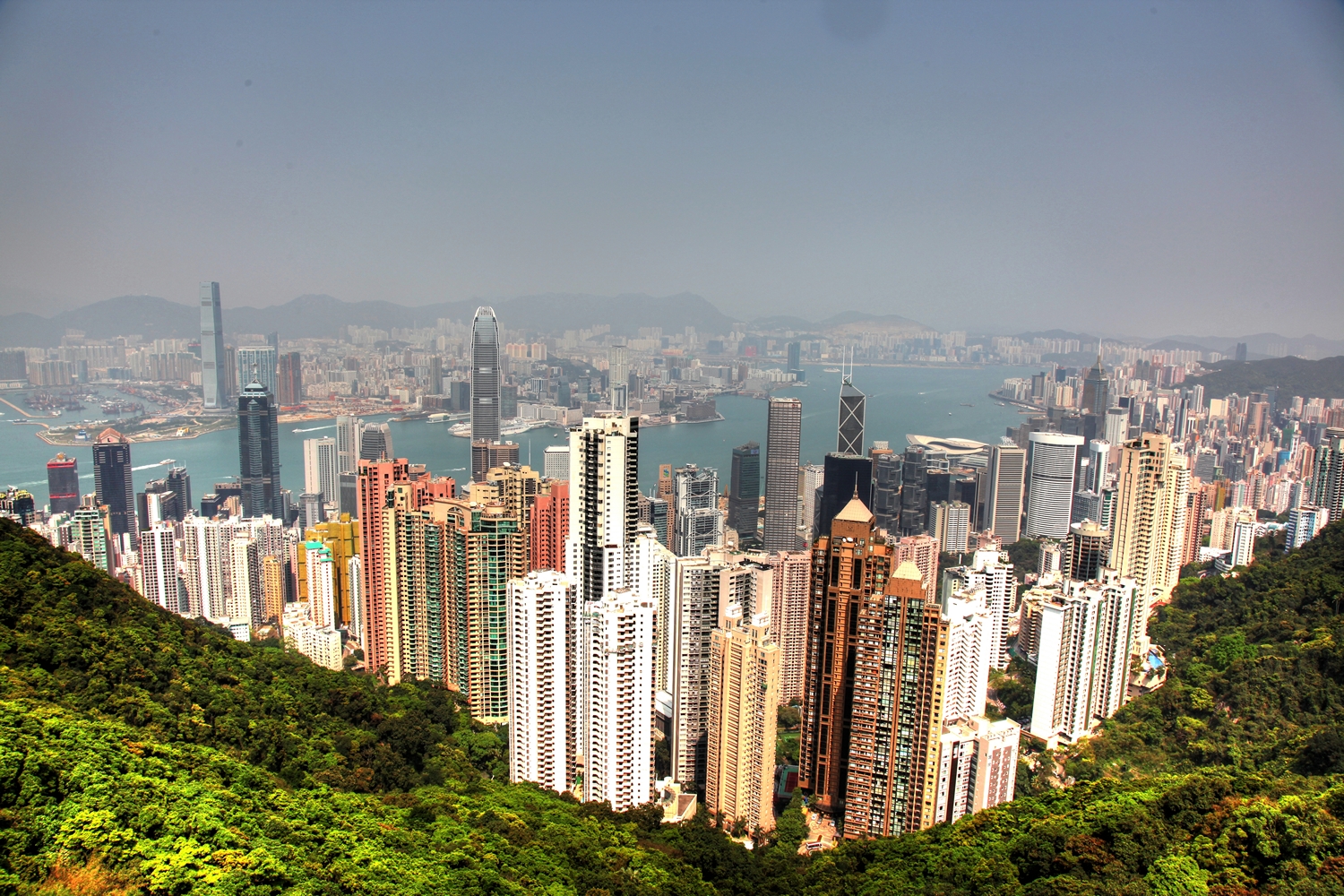
Davie Street, West End, Vancouver (photograph by Elvin Wyly)
Red Line, Washington Metro, Washington DC (photograph by Elvin Wyly)
La Sagrada Familia, Barcelona (photograph by Elvin Wyly)
The Peak, Hong Kong (photograph by Elvin Wyly)
UBC, Irving K. Barber Learning Centre (center, background), Indian Residential School History and Dialogue Centre (right, foreground) (photograph by Elvin Wyly)
Downtown Los Angeles (photograph by Elvin Wyly)
